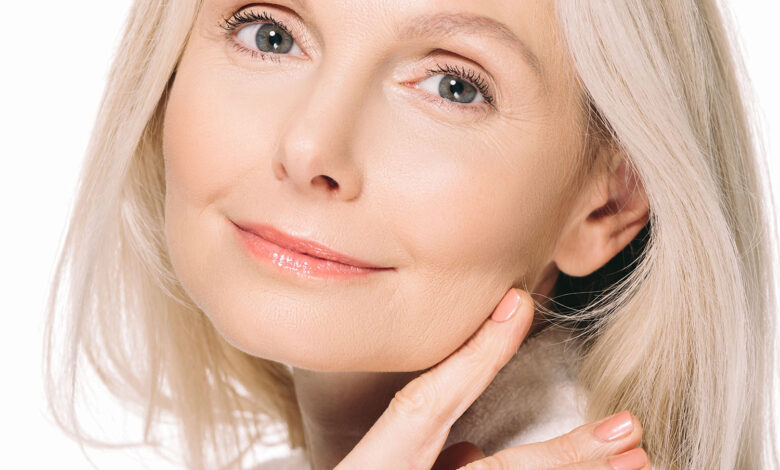Mother Nature’s botox and other nutrients and botanicals for beauty

There’s actually a very good, innate reason we care about the appearance of our hair, skin and nails. Not only are they a reflection of beauty, but they are also a sign of our overall well-being.
True beauty comes from within. And not just our personality and character, but the health of our skin (and hair and nails) paints a picture of how healthy we are on the inside and how nourished we are.
When we are deficient in nutrients, the wisdom of our body is to pull first from the areas that can afford it (skin, hair and nails) and send those nutrients to our vital organs instead. Thus skin, hair and nail issues are a sign that something inside of us is out of balance or lacking.
Micronutrient deficiencies show up in our outward appearance. Thinning hair or white spots on the nails can indicate a zinc deficiency, while easy bruising, petechiae and skin tears can occur due to a lack of vitamin C and brittle nails can mean we are low in protein or in silica, an important mineral for collagen production.
When we think of beauty and looking healthy and youthful, we often think of collagen. This is because collagen is well known as one of the most abundant proteins in the human body and is very important for structural tissues, like skin, hair and nails. If we have a deficiency or as we age, our body’s natural ability to produce collagen declines, leading to fine lines and a lack of skin elasticity.
Slowing down collagen degradation is absolutely key to supporting healthy aging and tissues. So how do we do that? We can start with collagen supplements, most often in the forms of powder or liquids. It is best to choose high quality products from good sources. Actual collagen comes from animal sources, usually bovine, chicken or marine. It is important to choose grass-fed or wild-caught sources for higher quality and to opt for collagen in the form of peptides for higher absorbability.
In addition to collagen, there are also botanical collagen boosters, which are herbs that help our bodies enhance natural collagen synthesis and increase the efficacy of any collagen supplements we are taking. These herbs are consumed internally as supplements unless otherwise specified and include:
Gotu Kola – Known as “mother nature’s botox” because it structurally repairs collagen, strengthens collagen integrity and promotes healing of collagen in the body, including better wound healing, venous and skin integrity and bone density.
Horsetail – Contains the mineral silica, which contributes to collagen structure and integrity, gives elasticity to tissue, connective tissue and hair, skin, nails and bone.
Stinging nettle – Known as a “mineralizer” because it is abundant in minerals like zinc, magnesium, manganese and iron, which are important for microcirculation and good skin oxygenation.
Calendula (marigold) – A great topical in an oil base for healing skin, reducing inflammation, eczema, insect bites, dermatitis or skin wounds.
Licorice – Also known as “Mother nature’s steroid,” it is applied topically for eczema and any inflammatory skin issues.
Cleavers – For acne and lymphatic drainage, or the toxin waste removal of the skin.
Chaste tree/Vitex – For hormonal acne at any age, in males or females.
There are a few other important vitamins and minerals needed for skin health and collagen production. These include the fat soluble vitamins A and E, the water soluble vitamins B complex and C and the mineral zinc. Eating a whole food diet with healthy omega-3 fats, fruits, veggies and fermented foods, drinking plenty of water and supporting our gut health with probiotics and fiber are essential for good health and beautiful skin.
More than just our diet, however, we need to look at our overall lifestyle and mindset if we truly want to thrive and glow. There is a good reason for this. Stress and inflammation speed up aging and the degradation of collagen, also known as “inflamm-aging” (a term coined by Italian professor Claudio Franceschi, PhD). This idea began as a theory which linked inflammatory changes in the skin to the causes of many age-related diseases.
Stress management and healthy coping practices are absolutely key to beauty and health, in addition to supporting your adrenals (the glands that make cortisol) with adaptogens like ashwagandha, rhodiola and eleuthero. These help your body become more resilient to stress over time and work like anti-aging tonics.
For any inflammatory skin conditions, mushrooms, herbs and spices, such as reishi, andrographis, echinacea, cat’s claw, turmeric, rosemary and saffron are wonderful and can be regularly consumed internally in supplement form. n
Abby Vallejo was born in the Chicago area but grew up in Neenah, Wisconsin. She originally received a BA in International Relations from Florida International University in Miami as she loves culture, international travel and speaks four languages fluently. As her personal interest in holistic health, nutrition, and exercise increased over time, she decided to go back to school to become a Registered Dietitian. She graduated from the University of Wisconsin at Green Bay with a degree in Human Biology & Dietetics and went on to do her Dietetic Internship with Wellness Workdays, based in Hingham, Massachusetts. Abby is also a Certified Personal Trainer and enjoys training and counseling clients one-on-one to help them achieve their wellness and fitness goals.
Abby worked in the vitamin and supplement industry while pursuing her nutrition degree and was delighted to return after earning her credential as a Registered Dietitian. She is passionate about balance, wellness and all things holistic. In her free time she enjoys going to the gym, traveling and spending time outside in nature.
Sources: Article: A Naturopathic Approach to Healthy Skin, Wholistic Matters: https://wholisticmatters.com/natural-approach-healthy-skin/#.
Podcast: Healthy Hair, Skin and Nails ft Dr. Angela Hywood, Wholistic Matters: https://wholisticmatters.com/healthy-hair-skin-and-nails/
Journal: Franceschi C, Bonafè M, Valensin S, Olivieri F, De Luca M, Ottaviani E, De Benedictis G. Inflamm-aging. An evolutionary perspective on immunosenescence. Ann N Y Acad Sci. 2000 Jun;908:244-54. doi: 10.1111/j.1749-6632.2000.tb06651.x. PMID: 10911963.
“If we have a deficiency or as we age, our body’s natural ability to produce collagen declines, leading to fine lines and a lack of skin elasticity.”




